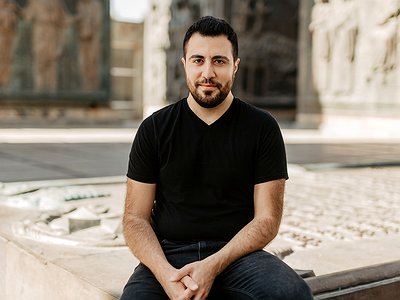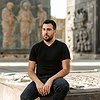Part 1
Name: Giorgi Mikadze
Nationality: Georgian
Occupation: Pianist, composer, improviser
Current Release: Georgian Microjamz on Rarenoise Records
Recommendations: I would suggest to learn new things, to be open minded, to expand your own borders of knowledge. It doesn’t matter if it's a book, music, art. I want to suggest listening to Georgian folk music. It is one of the earliest and richest polyphonic traditions in the world. In my opinion, it hasn’t received the attention it should from the international music community. It has been a great source of inspiration for me. To quote Igor Stravinsky, “Georgian folk music has more new musical ideas than all contemporary music.”
If you enjoyed this interview with Giorgi Mikadze, visit his website to further explore his music and perspectives.
When did you start playing your instrument, and what or who were your early passions or influences? What is about music and/or sound that drew you to it?
Growing up, I immersed myself in classical music. I began studying piano at the age of four with my mother, a professional choir singer, and later entered into the Tbilisi Music School for Gifted Children. At age 11, I began receiving lessons in jazz, improvisation, and composition. I attended concerts and opera shows almost daily. I even sang for the Tbilisi Boy’s choir for a time.
One of the biggest influences on my musical development was Oscar Peterson. I still remember how amazed I was the first time I heard one of his records. His approach to playing piano was absolutely extraordinary. I had never heard anything like it before. This was one of my first introductions to musical genres other than classical. With the money I received from my first presidential scholarship, I soon bought my first CD player and listened to every genre of music I could find, from classical to jazz to even rock n’ roll. All forms of music interested me then and even now.
After graduating from Tbilisi Music School for Gifted Children, I was accepted into the Tbilisi State Conservatory. There, I studied under the tutelage of Professor Revaz Tavadze, whose teacher’s teacher’s teacher’s and so forth was once a pupil of Beethoven himself! Although I was there to study classical music, I admitted to my teacher that I was more interested in playing jazz. He was not against me eventually making this transition, but he urged me to develop my technique for classical music before moving on to jazz. I carried on with my classical music studies but continued fulfilling my passion for jazz on the side. I formed a jazz trio and we even gave a few recitals. I played most of those jazz standards by ear. I was not too knowledgeable back then, so my improvisation was really more of an imitation of other jazz pianists I had heard.
When I got accepted at Berklee College of Music, I was free to devote all my time to jazz, playing and jamming with a number of professions, both professionally and casually. Those were some of the best times of my life.
For most artists, originality is first preceded by a phase of learning and, often, emulating others. What was this like for you? How would you describe your own development as an artist and the transition towards your own voice? What is the relationship between copying, learning and your own creativity?
True! All artists get their start in learning from the greats. Even Bach, considered by many to be one of the founding father of Western Classical Music, said his musical style and philosophy was shaped by the works of Dieterich Buxtehude. In my case, I was influenced by a variety of musical genres and incorporate a lot of what I listen to into my music. I borrow rhythms from Bossanova and employ microtones and polyphony found in Georgian folk music.
It is important for artists to learn from one another. At the Berklee College of Music, we had assignments in which we had to improvise in the styles of Bud Powell, Thelonious Monk, Herbie Hancock, Art Tatum and other jazz greats. In these assignments, we needed to absorb these styles to better understand them. It was only after studying the styles of others that I felt I could find my own distinct voice.
What were some of your main artistic challenges when starting out as an artist and in which way have they changed over the years?
When I first began performing, I had terrible stage-fright. I remember how nervous I was when I had a solo in the Tbilisi Boys Choir concert – my legs would not stop shaking and I felt like my voice was trembling. It was a terrible feeling, but it goes away with time and effort! After a few more concerts, I learned to enjoy performing for an audience and eventually overcame my stage-fright. Now I seldom get nervous when I perform in front of an audience. In fact, I enjoy it.
Tell me about your instrument, please. How would you describe the relationship with it? What are its most important qualities and how do they influence the musical results – and possibly even your own performance?
As a pianist, I place great value in the touch of the keys i.e. how sensitive they are to the finger’s touch. I need the piano to be able to produce the exact sound I want. Otherwise, the chords and polyphony I want to play are not adequately communicated to the listener.
I always make sure my piano is clean. Before I play, I always wipe the keys with a wet cloth. I find that any grime or stickiness on the piano will distract me from focusing solely on the music.
Derek Bailey defined improvising as the search for material which is endlessly transformable. Regardless of whether or not you agree with his perspective, what kind of materials have turned to be particularly transformable and stimulating for you?
Every composition has an underlying theory holding it together. The same is true of improvisation. In the simplest terms, improvisation consists of an exposition introducing certain musical ideas, a development, where these musical ideas are expanded upon, and a recapitulation. I tend to shape my improvisations according to certain classical forms, but I can sometimes go on a tangent and lead my improvisation into a completely different direction. Sometimes, I do not even return to the ideas introduced in the exposition!
How is playing live in front of an audience and in the studio connected? What do you achieve and draw from each experience personally? How do you see the relationship between improvisation and composition in this regard?
I find that playing in front of an audience is much easier than recording in a studio. Without an audience, I find it hard to feel “a vibe” under which to play. But I still enjoy recording. Making my own album was very special and unique
Could you take us through a day in your life, from a possible morning routine through to your work? Do you have a fixed schedule? How do music and other aspects of your life feed back into each other - do you separate them or instead try to make them blend seamlessly?
If I am touring, my daily routine is unpredictable. But if I am at home, its more or less under a schedule.
My morning begins with a cup of coffee and breakfast. I make a schedule for the rest of the day and try my best to follow it, though I am sometimes forced to improvise (just like in music). One thing that never changes in my schedule is my three hours of daily practise. This is absolutely essential in maintaining my technique. As Vladimir Horowitz once said, 'If I don't practise for a day, I know it. If I do not practise for two days, my wife knows it. If I don't practise for three days, the world knows it”. Practising everyday for three hours requires strict discipline, and it can sometimes be hard. But every musician must do it.






